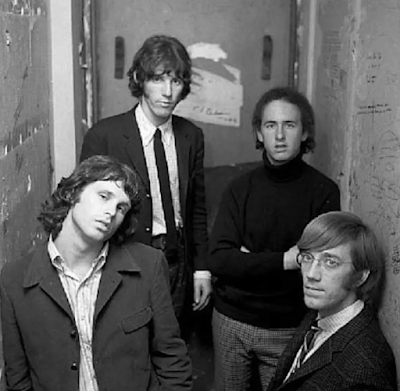THE DOORS’ "STRANGE DAYS" AND SOCIAL CHANGE IN THE ‘60s
The Doors' "Strange Days" is the title track of the band's second album, released in September 1967.
It is also the opening song of this beautiful LP,
which marks the band's entry into psychedelia while maintaining the Rock
framework expressed on their debut album ("The Doors", January 1967).
With its poetic and cryptic lyrics, this tune talks
about the cultural changes that were taking shape in the United States at that
time.
Its central theme concerns the rising of the
counterculture in the U.S. and the attempt to free the people themselves from
rigid conservative value paradigms and oppressive social rules.
In the elaborate arrangement of this composition, we
recognize the transgression of rules and the young generations’ desire to open up
new and unexplored possibilities.
Jim Morrison sketched these cultural shifts with an obscure
and metaphorical language, looking at society from the perspective of the
American youth to which he belonged.
In fact, he was 22 years old when he composed “Strange
Days” and 23 when it was released on vinyl.
Before The Doors’ singer and poet, other songs had
vividly recounted some crucial passages in the evolution of American and
British society during the 1960s.
We’d like to mention two of them in particular.
The first is "The Times They Are A-Changing",
recorded by Bob Dylan in the fall of 1963 and released on the album of the same
name in February 1964.
On this stirring track, acoustic guitar, harmonica and
vocals are the means by which Dylan unceremoniously invites the older generation
(he was 22 at the time) to step aside.
The strong-willed and impassioned verses of the lyrics
combine in a melody as simple as it is compelling, resolutely demanding to clear
the way for the construction of a more just, supportive and tolerant society.
The other example is The Who's "My Generation",
released as a single in October 1965 and on the British group's first album
about a month later.
Again, the social and cultural context being attacked
is that of the older generation, with its habits and life goals described as “Awful
cold”.
The Who do this through a very controversial and harsh
lyric for the mid-1960s, going so far as to declare, "Hope I die before
I get old”.
The song, right from its title, takes the lead in the
generational conflict we mentioned at the beginning, and sets it on fire with
the raw sounds of Rock, which was emerging as a well-defined genre in those
very months.
It is a bold act of youthful defiance, propelled by
the percussive chords of Townshend's electric guitar and aimed squarely at the repressive
society of the early 1960s.
With the lyrics of the song "Strange Days",
Jim Morrison adds a further dimension to the theme covered by these two songs.
The Doors thus offer their own fascinating and poetic interpretation of the collective youth upheavals that shook the U.S. society during the second half of the ‘60s.
Come back to our blog, we release new original articles every monday and thursday.




Comments
Post a Comment